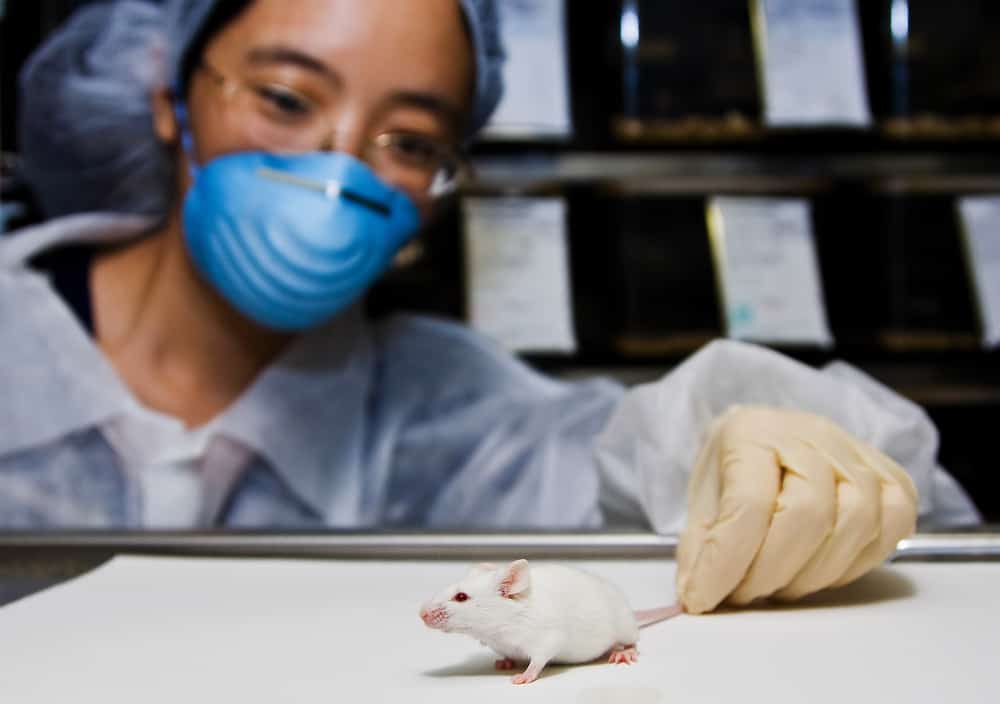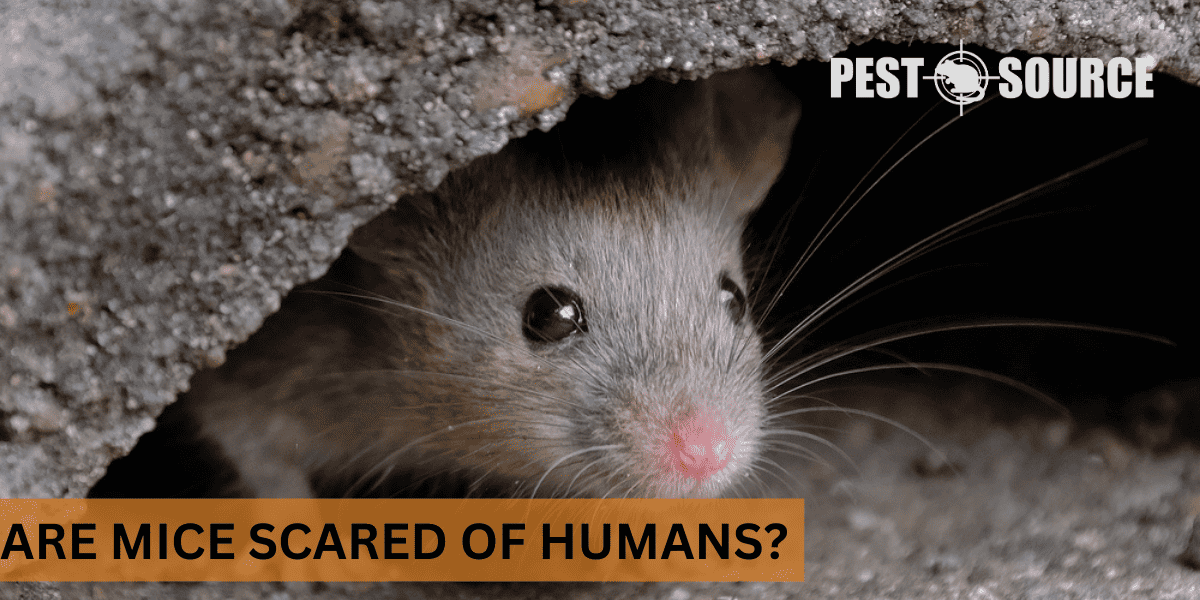Mice are typically scared of humans and tend to avoid direct contact. This article delves into their instinctual fear of larger predators, including humans, and how this behavior affects their interaction with human environments, important for understanding and managing infestations.
POINTS
- Mice are generally scared of humans due to their predator-prey relationship, historical encounters, human behaviors, human scent, and intrusion on their territory.
- The fear mice have for humans can be overridden in certain cases, like extreme hunger or thirst, habituation in highly populated human areas, or in safe environments where humans pose no direct threat.
- Physiological effects of fear on mice include increased heart rate, heightened alertness, and dilated pupils. In extreme cases, fear can lead to a fatal condition known as ‘Capture Myopathy,’ although this isn’t common.
- You should act calmly if you spot a mouse in your home to prevent it from running and hiding. Mice can bite if they feel threatened, so avoid cornering them or trying to catch them with your hands.
- The best way to catch a mouse can vary but includes using snap traps or live-catch traps for a solitary mouse. Larger infestations might require professional pest control services, and safety measures like wearing gloves should be taken when handling trapped mice.
What is the Relationship Between Mice and Humans?
Humans and mice have a long, complex history. Our common environments and the mouse’s unique adaptability have made these rodents both a critical part of scientific research and an annoying pest.
How has the relationship between humans and mice evolved over time?
Over time, mice have evolved alongside humans, primarily due to our shared habitats. Historically, humans have viewed mice as pests because of their tendency to devour food stores and contribute to the spread of diseases. Thus, humans have often hunted and exterminated mice, leading to a generally antagonistic relationship.
Are mice scared of humans?

Yes, mice are generally scared of humans. Think of it as a natural safety mechanism: big creatures (like humans) mean potential danger and it’s best to run and hide. You can chalk this up to the predator-prey relationship between us and them, which we’ll talk more about in the next section.
Why is understanding if mice get scared of humans significant?
Understanding if mice are scared of humans and why it matters has a few implications. First, it can inform how we handle mouse sightings in our homes – knowing that loud noises and sudden movements can scare them off can be useful. Second, understanding the believed threat we pose to these creatures is also part of a more humane approach to pest control.
Why Are Mice Scared of Humans?
Now that we’ve established that mice are indeed scared of humans, let’s dive into the main factors contributing to this fear:
1. Predator-Prey Relationship

Instinctively, mice identify humans as predators, much like birds of prey or snakes. This fear is hard-wired from thousands of years of evolution where the main goal of any creature, including our little rodent friends, was survival.
2. Historical Encounters
Mice have learned to associate humans with danger historically. This is due to human practices of hunting, trapping, and exterminating mice, particularly during heavy infestations. The mice that survived these cullings transferred their learned fear of humans to their offspring, resulting in generational reinforcement of this fear.
3. Human Movements and Behaviors
Mice have very sharp senses. Suddenly dropping a book on the floor, switching on the light, or simply walking by can send a mouse bolting for cover. This sensitivity to vibrations and loud noises is a survival trait that helps them detect and evade threats.
4. The Role of Smell
The olfactory prowess of mice is astonishing. They use their noses not just for finding food but also for detecting danger. The human scent, vastly different from their natural environment, works as an alarm signal for them.
The 2014 McGill University Study

An interesting piece of research from McGill University in 2014 unveiled that male human scent triggered stress responses in mice than female scent. The study suggested it could be an evolutionary adaptation since male predators are usually more aggressive. This has significant implications for laboratory experiments as the presence of male researchers could unknowingly set off fear responses in test mice.
5. Novelty and Territory
Mice are territorial by nature. They mark their habitat with scent trails and can perceive intruders or changes in their environment. A novel scent or figure, like that of a human, can cause them to react defensively or with fear.
Are There Situations Where Mice Aren’t as Scared of Humans?
Although it’s clear that mice inherently fear humans, there are some exceptions to the rule. Under certain circumstances, a mouse’s survival instincts might compel it to risk closer encounters with humans or become somewhat familiar with human presence.
Survival Instincts Overcoming Fear

Even though mice fear humans, survival instincts can momentarily override their uneasiness. If a mouse is extremely hungry or thirsty, it might risk exposure to find food or water.
Getting Used to Safe Environments

In an environment where humans consistently do not pose any direct threat, mice can learn to tolerate their presence. For instance, laboratory mice or pet mice may appear less fearful since they associate humans with safety and care.
Habituation in Highly Populated Human Areas
In regions with dense human populations, mice may become accustomed to human activities to some degree. Repeated exposure to humans without direct harm could reduce their initial wariness. However, it’s important to note that this should not be mistaken for mice becoming friendly. They remain an animals that prefer to steer clear of humans unless absolutely necessary.
These adaptations should not give you a sense of complacency. Mice are still likely to flee when they encounter humans, and these exceptions are indeed rare. But it’s worth understanding these potential scenarios as part of the overall relationship between humans and mice.
The Physiological Effects of Fear on Mice
It’s not only the psychological aspect of fear that affects mice; physiological changes also occur when these small rodents feel stressed or threatened.
Can you scare a mouse to death?
As extreme as it sounds, it is technically possible to scare a mouse to death. Fear can cause a surge of stress hormones, leading to a condition called ‘Capture Myopathy.’ Although rare, it ultimately could result in heart failure.
Can mice die from fear?
Yes, similar to the point above, excessive fear or stress can lead to a fatal condition in mice called ‘Capture Myopathy.’ This condition is due to a tremendous outpouring of stress hormones that puts enormous strain on the cardiac system, which may result in sudden death.
How likely is it for a mouse to die from fright?
While it is hypothetically possible for a mouse to die from fright, it’s not a common occurrence. The mouse would need to be subjected to extreme stress or fear, which isn’t typical even in mouse-human encounters. Usually, the mouse will escape and hide at the first sign of perceived danger.
Can mice experience heart attacks when scared?
Just like humans, mice can experience heart issues. Excessive stress or scare can lead to a rapid increase in heart rate, resulting in a form of heart failure brought on by intense fear.
What are the physiological reactions in mice when they are frightened?
When a mouse senses danger, its ‘fight or flight’ response is triggered. This results in several physiological changes such as increased heart rate, heightened sense of alertness, and readying of muscles for quick action. Other changes may include dilated pupils and increased blood flow to muscles.
Dealing with Mice: Precautions and Tips
Mice might be small creatures, but they can pose serious problems when they set up residence in your home. Knowing how to act when you spot a mouse could be crucial for dealing with either a solitary rodent or a potential infestation.
How should one act if they spot a mouse in their home?
If you spot a mouse in your home, it’s crucial to stay calm. Jerky movements or loud noises might scare the mouse, causing it to run and hide, making it harder for you to track its movements or locate its nest.
Can mice bite?
Yes, while it’s not common, mice can and do bite, usually as a defensive technique when they feel threatened. This might happen if you corner a mouse or attempt to handle it. Their bites can lead to infections or diseases, so it’s best to avoid a situation where a mouse might bite you.
What is the best way to catch a mouse?
The best way to catch a mouse depends on your circumstances. For a single mouse, conventional snap traps or live-catch traps might work quite effectively. On the other hand, for larger infestations, you might require professional pest control services. Remember to place traps near areas where you’ve seen mice activity and use suitable bait like peanut butter, chocolate, or fruit jams.
Try to avoid handling caught mice directly, and definitely wear gloves if you must do so. Mice might not be typically dangerous, but they can carry diseases or attract parasites, so it’s best to maintain a safe distance.



